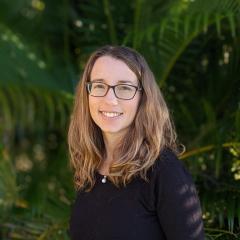CPF researchers Dr Jen Yarnold and Dr Ray Maher have been working with the Chamber of Commerce and Industry Queensland to deliver the CE4B pilot, a program designed to support small-to-medium enterprises transition to a circular economy model.
Circular Economies for growth and sustainability
With the challenges of a growing waste epidemic, plastic pollution and climate change, many governments, businesses, and individuals are looking for better ways to reduce, reuse, and recycle. One of the most recognised effective ways to do this is through Circular Economy principles, which seek to design out waste, regenerate natural systems and maximise the value of materials and goods by keeping them in use for as long as possible. The Circular Economy represents a paradigm shift from our current ‘take, make and dispose’ linear processes of production and consumption where most products are used for a short while and eventually make their way into landfill.
Challenges and opportunities for Queensland businesses
Not only can a circular economy create a more sustainable future, if done right, it can unlock tremendous economic value for businesses – large and small – through increased efficiency, greener products and services and turning ‘waste’ into valuable new resources. In Queensland, small-to-medium enterprises (SMEs) make up over 99% of Queensland’s businesses, which means their participation is essential for the Sunshine State to achieve a circular economy. But SMEs typically have much less finances, staff and resources at their disposal than big business – what they need is training and support to help them make the transition. And despite a growing number of circular economy training programs becoming available, a review by CPF researchers Dr Yarnold and Dr Maher found that most programs were incompatible with the needs of small business, instead being tailored for larger organisations and focusing on theoretical issues rather than practical solutions that could be implemented on the ground.
CE4B Pilot Program
To support Queensland businesses wanting to go circular, Dr Yarnold and Dr Maher were engaged by the Chamber of Commerce and Industry Queensland (CCIQ) to design and deliver the Circular Economy 4 Business (CBE4) pilot program for small-to-medium enterprises (SMEs), funded by the Queensland Government’s Department of Environment and Science.
The CE4B pilot program supported three Queensland SMEs over a 12-month period in 2020-21. The pilot was designed to equip SMEs with knowledge of circular economy theory, practices, design, planning tools, and connections to professional networks. SME teams were provided with personalised coaching, up to AU $15,000 to help finance implementation of their circular economy ideas and a training workshop where they could develop their ideas and build a viable business case.
Case Studies of Circular Economy in Action
The three SMEs selected to participate—Atlas Soils, Full Circle Fibres, and The Truss Company—were from diverse sectors and each proposed a circular solution for key waste resources.
Atlas Soils is a Townsville-based start-up that uses a natural microbial technology to convert organic wastes into microbial rich humic soils and soil conditioners. Through the CE4B program, Atlas Soils set out to create a circular organics-to-nutrients economy, expand its customer base, and scale its range of products and services.
Full Circle Fibres (FCF) vision is to create a fully domestic, closed-loop textile supply chain by testing Australia’s national capability to repurpose textiles from end-of-life garments and offcuts. Through the program, FCF built a pre-feasibility business case that could be developed at commercial scale based on data gleaned from new partnerships that were trialled along the supply chain.
The Truss Company (TTC) is a prefabricator of timber roof trusses, wall frames and flooring in the residential construction industry that seeks to become a ‘zero waste’ business. Expanding on its current sustainable practices, TCC sought to find ways to divert its treated timber offcut waste from landfill, minimise packaging waste and reduce transport emissions.
Impact & Success:
Each business achieved noteworthy achievements with their new or enhanced circular business models over the course of the CE4B program:
Atlas Soils diverted over 1,000 tonnes of green waste and 300 tonnes of soil from landfill, and produced enough HumiSoil to remediate around 250 hectares of land. The company also developed a new cradle-to-cradle model that converts a farm’s ag-waste to humic soils which can be reapplied back onto the farm. These services have potential to be expanded to the domestic lawns and sporting field markets.
Full Circle Fibres secured agreements with industry partners to sort, shred, and spin quantities, run small-scale trials with limited quantities of materials, and evaluate the project performance. This helped divert 200kg of fibre and textile waste from landfill and created new produces to showcase to potential end-users such as government departments and corporations.
The Truss Company worked towards “zero waste” by eliminating or reducing waste streams such as packaging made from plastic, steel or cardboard, and by developing a new system to sort and collect these materials. They also secured an agreement with suppliers to return plastic waste for recycling, implemented alternatives to steel strapping timber, identified opportunities to repurpose sawdust, and developed other partnerships to facilitate CE.
The unique and innovative successes of Atlas Soils, FCF and TTC show that circular business models can be successful with the right support, and that the SME circular economy model can be implemented across similar sectors, and upscaled for further economic and social benefits across the state.
I loved the interactions with the workshops and meeting the other businesses, it was fascinating that the researchers were blown away by how much we got done on the modest budget - in small business you can just decide to do things, no great approvals process or levels of management to sign off. Try it, if it needs tweaking change it, try again, see what happens - this is how real innovation happens in practice’ – Participant



